This is why people are queuing up outside bank branches in rural India
There are several rumours doing the rounds that the government will take back the Rs 500 that has been deposited in the Jan Dhan accounts if the cash is not withdrawn at the earliest

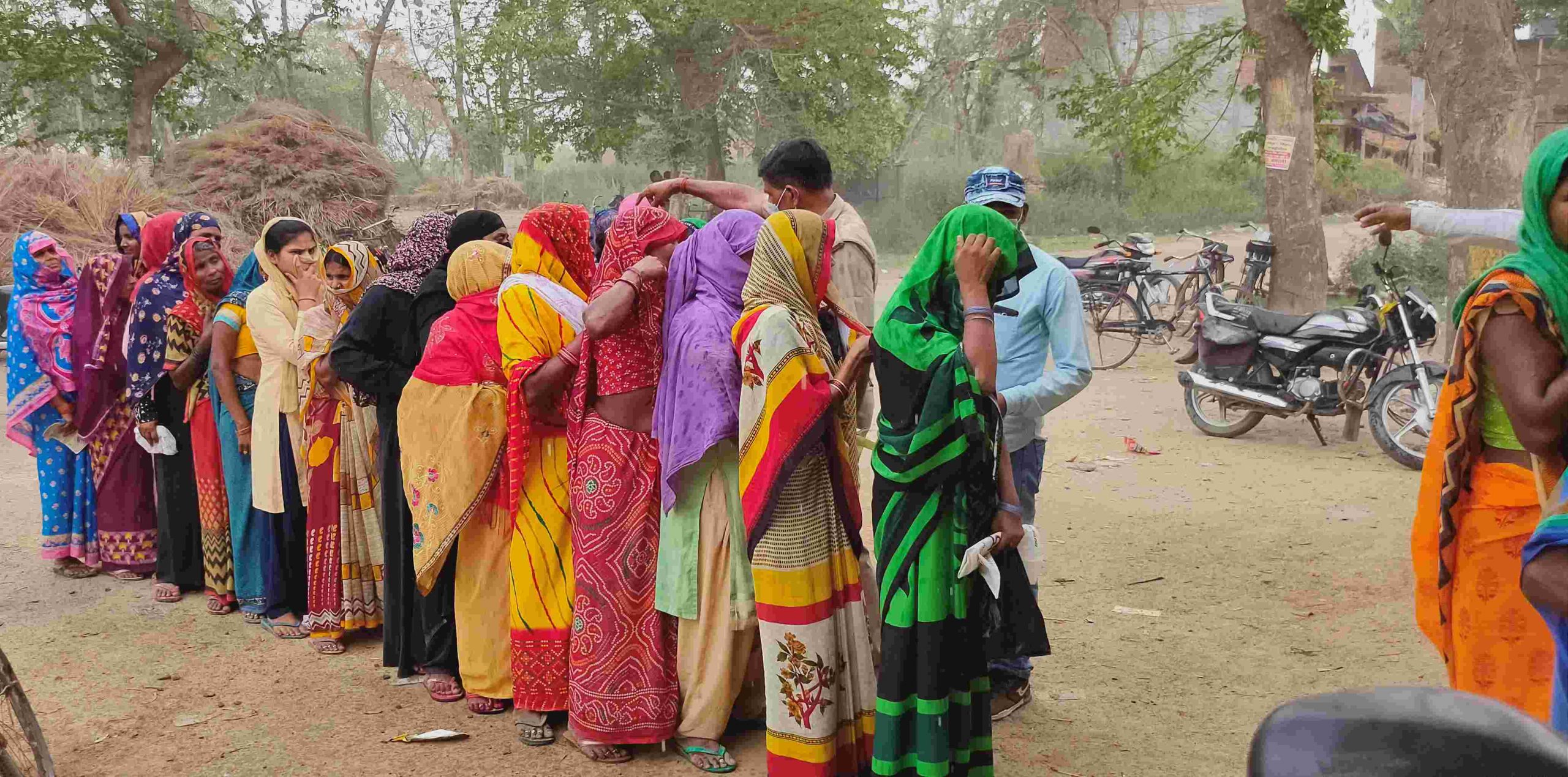
Asha Devi, 30, a resident of Miranagar in Sitapur district of Uttar Pradesh, was standing in a queue outside a bank. It was sunny, but suddenly it started raining. She kept standing in the queue after securing the withdrawal form inside her passbook beneath the pallu of her saree. The reason Asha Devi braved the scorching sun, the rain and the risk of coronavirus infection was because she wanted to withdraw the Rs 500 that the government had put in her Jan Dhan account at any cost.
“Everybody is saying, if you don’t withdraw the money, the government will take it back. That is why I am here standing in line,” she said. There were 50 others standing outside the Aryvarat Gramin Bank, out of which more than 40 were women. Most of them had come to withdraw Rs 500 from their Jan Dhan accounts. Most of these women revealed they are doing it for the fear of the amount being taken away from them if they don’t withdraw.
Prime Minister Narendra Modi had announced the Pradhan Mantri Jan Dhan Yojana on August 15, 2014, during his first term. This was the first time since its launch on August 28, 2014 that there was a transaction of crores through such accounts and the move has been widely appreciated by crores of women.
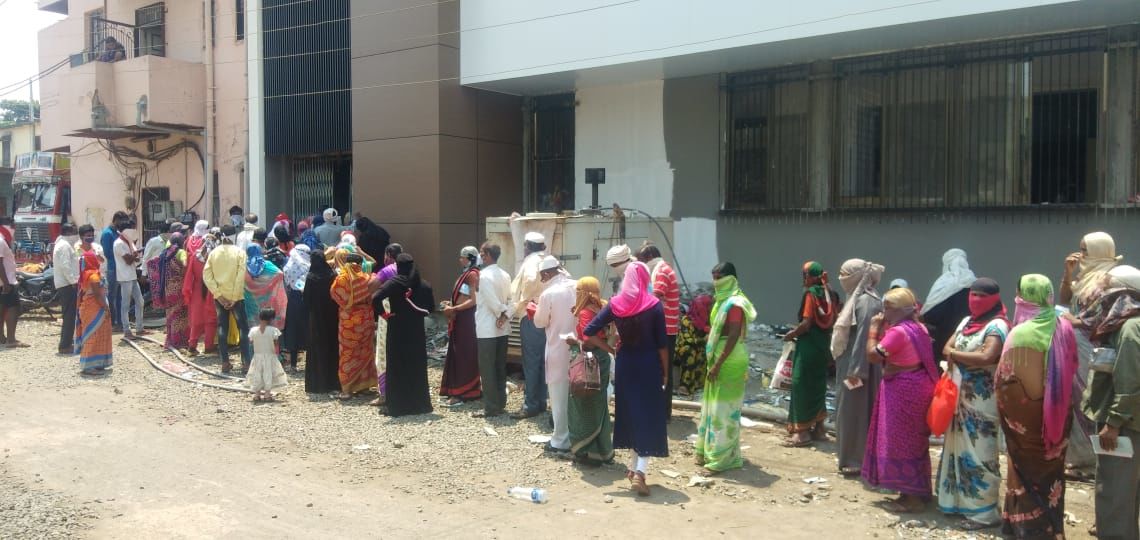
Until April 19, more than Rs 36,659 crore have been transferred to bank accounts of 16.01 crore beneficiaries during the lockdown through Direct Benefit Transfer (DBT) under the Public Financial Management System (PFMS).
Moni, a resident of Pipri Shadipur village of Pisawan block in Sitapur district of Uttar Pradesh, had withdrawn Rs 500 in the first week of April. She admitted that this Rs 500 have been a great help for her during the current difficult time. Her husband is still stranded without any work in Maharashtra and is unable to send her money, but she was able to manage a little with this help of the government. The government’s aid to the bank accounts has helped crores of people like Moni during the coronavirus crisis. But, at the same time, people thronging the banks for the last 17-18 days to withdraw cash has increased the hardships of the bank employees.
Around 100 kms from Sitapur, where Asha Devi was, there was a queue outside the Grameen Bank in Belhara town of Barabanki district. People were sitting on the stairs outside the bank. The payment was being made against Aadhaar card through the gate of the bank itself. The branch manager was repeatedly appealing to the people not to rush and follow social distancing.
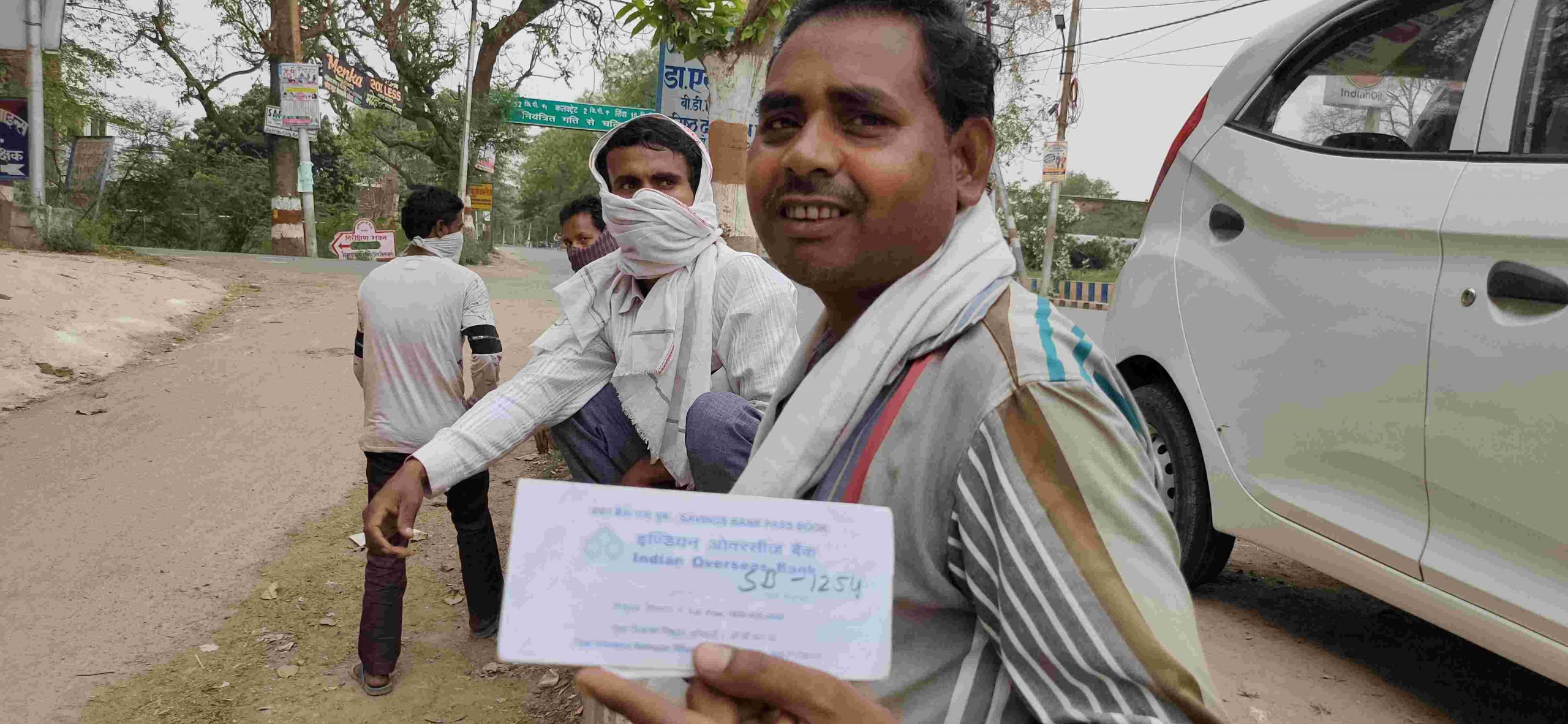
Ansar Jamal, the branch manager at the Grameen Bank Belhara, informed: “We have suspended all other banking activities and have been engaged solely in handing out cash to people. There are lots of payments to be made, including the PM Jan Dhan, PM Kisan, elderly pension and MGNREGA, so there is a lot of crowd. There is a general lack of awareness, so everybody wants to withdraw money immediately. It is being informed on TV that the money will not go anywhere, you (the media) can also co-operate in raising awareness.”
In order to rescue people from the money crunch during the coronavirus pandemic, the central government, under the Pradhan Mantri Garib Kalyan Yojana, has released Rs 500 for three months in the Jan Dhan accounts of women, Rs 1,000 for three months to the elderly and widows, the Ujjwala Yojana money for three months and Rs 1,000 per month in the accounts of poor road side vendors. Besides, MGNREGA money has also been sent to people’s accounts. Among all these, Jan Dhan and road side vendors have benefitted for the first time.
Under the economic package of Rs 1.7-lakh crore released by the central government to help the poor during the COVID crisis, the central government has sent Rs 500 in around 20.6 crore accounts of Pradhan Mantri Jan Dhan Yojana for women in the country in two installments — from April 3 to April 9. Rs 800 is being given under the Ujjwala Yojana.
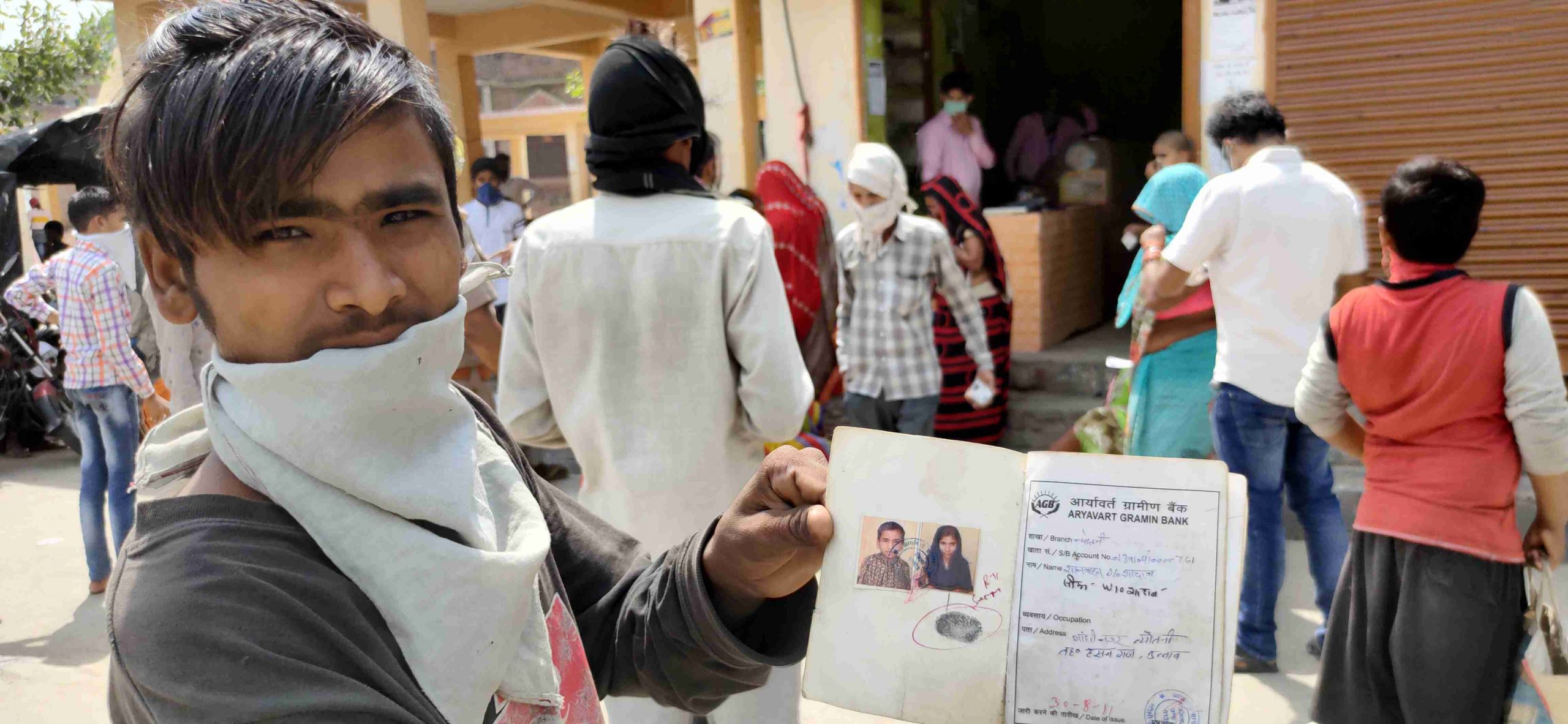
Shahnawaz, who stood outside the consumer center (where money can be withdrawn by showing Aadhaar and thumb impressions) at the Nyotini Nagar panchayat in Unnao district, about 100 kms away from Miranagar in Sitapur, has come to inquire whether the money of gas cylinders and Jan Dhan had come into the account of his mother. “Somebody was saying in the locality to withdraw the money or else it would go away,” he said.
“Nobody is able to work,” said Hussi Ullah, a corporator of Nyotini, standing beside Shahnawaz, where he was talking to the Gaon Connection. “So, people are thinking of withdrawing whatever money is coming into their accounts and that is why there is such a rush outside the bank. People are also feeling that this money, if not withdrawn quickly, will be taken back. We have explained to the people, but …”.
Gaon Connection spoke to Pradhan Mantri Jan Dhan Yojana, PM Kisan, Ujjwala Yojana beneficiaries and other villagers in several states, including Uttar Pradesh, in which it was admitted by all that in many places people fear the money to be taken away.
SM Naqvi, the branch manager at Aryavarat Grameen Bank, located in the Nyotini, Unnao, said: “Inside our branches, we are fully following the corona guidelines. We are supported by the police and the people alike. We are having around 200 transactions at the bank in a day and 300 people are withdrawing money through bank aides and CCs.”
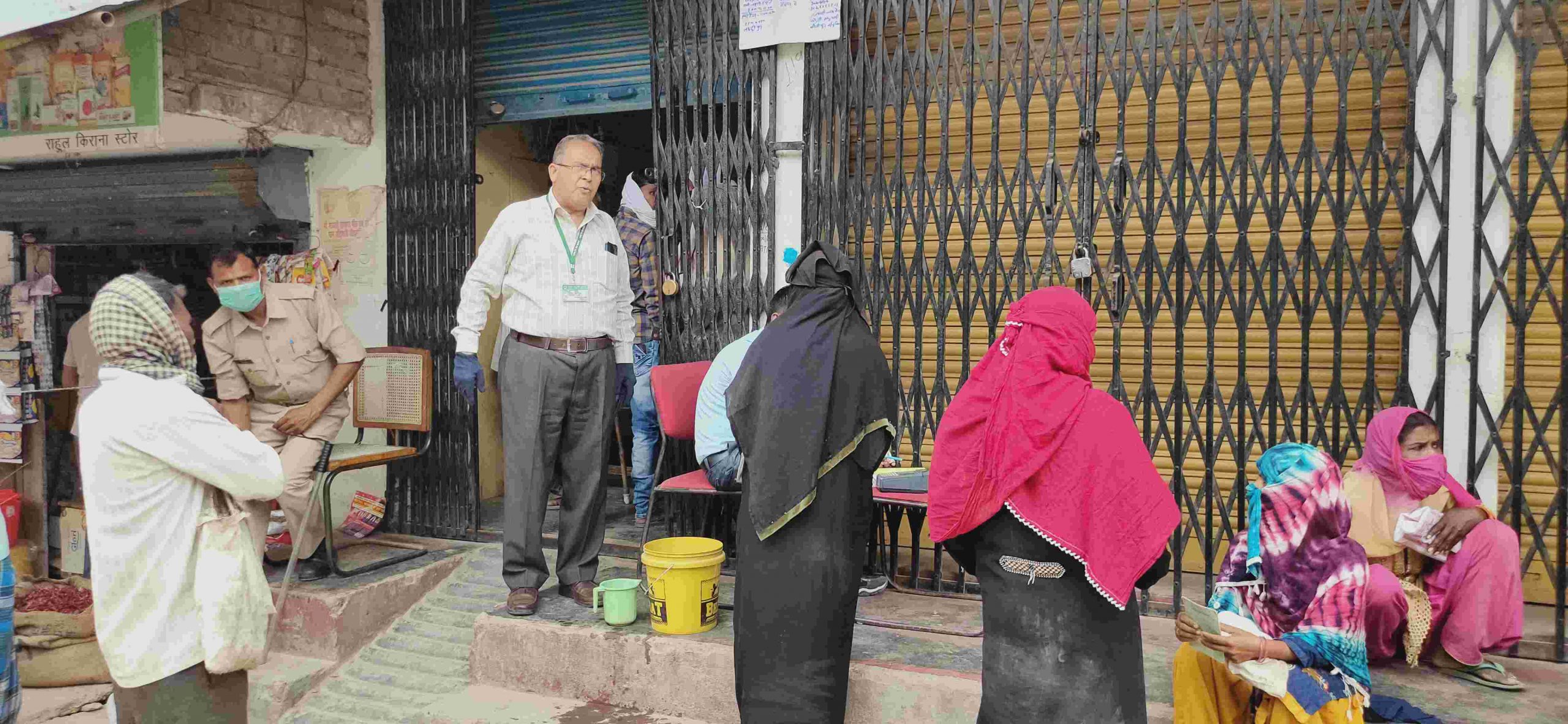
The government and the bank have consistently appealed to the people for the last several days assuring them that their money is safe in banks and they must withdraw only if required. The Indian Banks’ Association, an organization of banks in India, said in an appeal issued on April 2 that public’s money is safe in accounts. Through television, the administration at the local level is telling people that once the money comes into account, no one else can withdraw except the account holder, so no one can withdraw or return the amount.
Banks and police personnel have teamed up to draw white circles at a distance of one metre outside most of the banks. In many places, people have made arrangements to sit or stand at a distance from each other by placing brick items, etc, but still, at many places, these arrangements fall short of the surging crowds.
The fact that three active corona positive cases were found in Umarga in Usmanabad district of Maharashtra did nothing to discourage people to crowd its banks. Many local people also complained to the police administration but the crowd of people did not diminish.
Vinay Kumar Anju, the assistant general manager of Bank of India in Bhopal, Madhya Pradesh informed over the phone: “There is more overcrowding in rural banks than in cities. The withdrawing of Jan Dhan money from bank accounts had begun from April 3. Initially, the crowd was overbearing. There had been this fear of money being taken back. Now, it is much better than before, but poorer sections are still rumour-stricken.”
Piyush Rai, a journalism student, who lives in Hussaipur Kothiyan village in Mohammedabad area in Ghazipur district of Uttar Pradesh, said: “Many people in our village have withdrawn money in the accounts of the women of their home because they had heard that Modi jee would withdraw these money and spend it in the treatment of corona. These are all rumours but there is a general lack of awareness in the villages.”
Regarding the rumours, many women, on the condition of anonymity, have shared a variety of stories that are going on in the villages, but refused to let them further be shared in the newspaper or speak on the video. Many bank employees have also admitted that the government and the local administration have failed to convince the people that the money is theirs, the way the funds are dispatched, awareness should have also been worked out along.
Money allocation heads
The money will be given to every woman account holder (around 20.6 crore) associated with the Jan Dhan account for three months. The first instalment has been received. The May-June instalment is yet to come. Rs 800 is being given under the Ujjwala Yojana for three months, Rs 2,000 in 8.7 crore farmer accounts under the Pradhan Mantri Kisan Samman Fund, Rs 1,000 pension to elderly and widows of more than 60 years for three months (estimated budget of about Rs 3,000 crore) and Rs 1,000 for three months to the roadside vendors.

